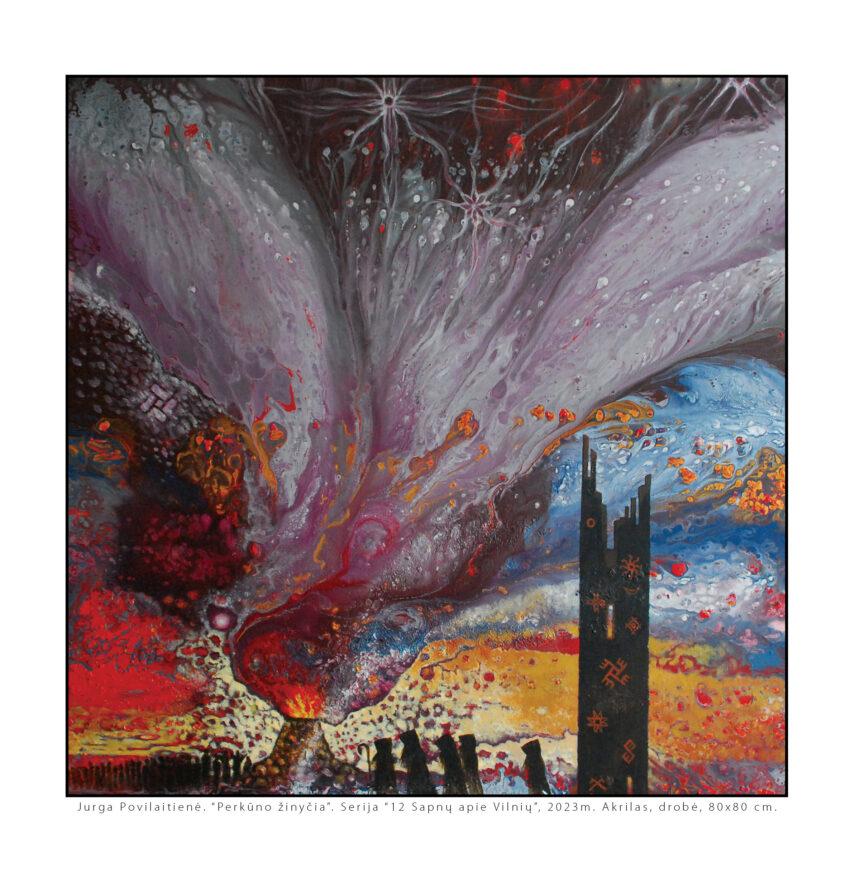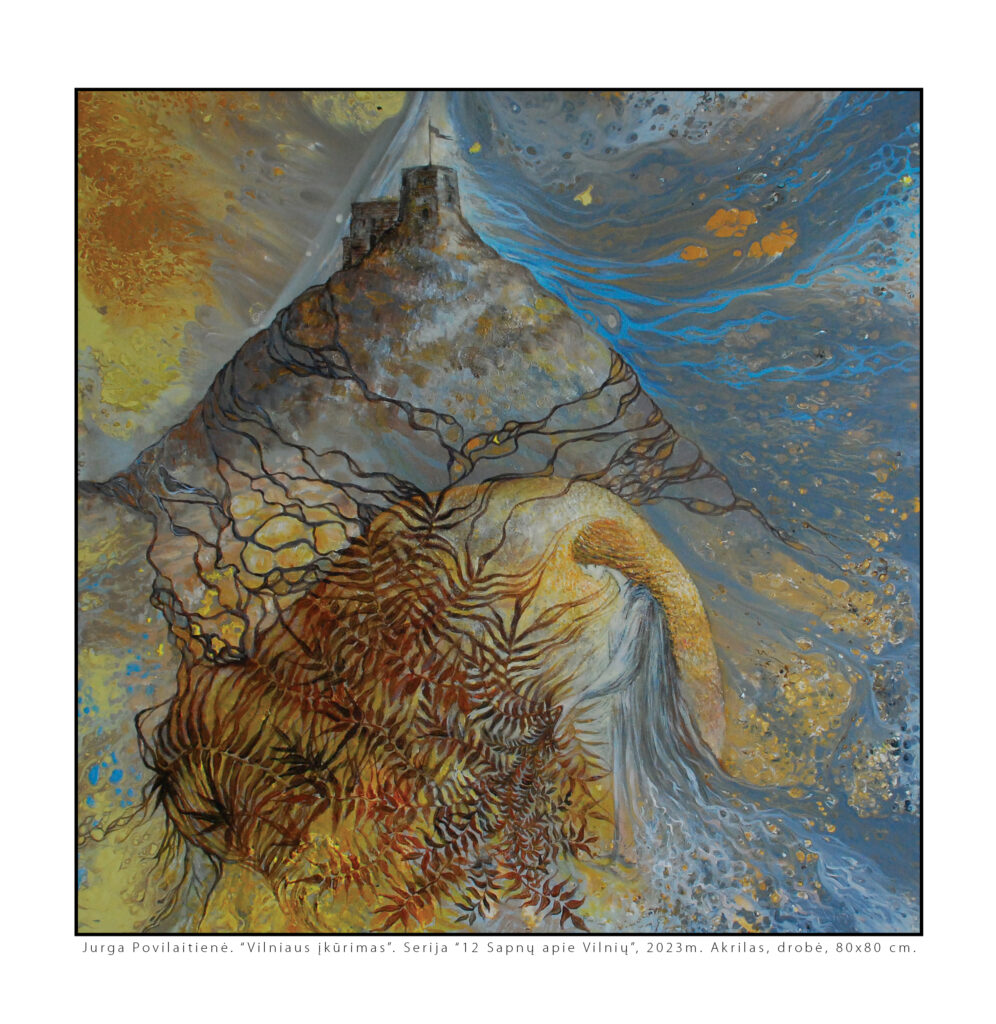Karaliui Mindaugui žuvus, Lietuvoje įsigalėjo suirutė, kuria pasinaudoję kryžiuočiai kelis kartus sunaikino šventąsias romuvas prie Nevėžio ir Dubysos.
Kunigaikštis Šventaragis tad sumanė pastatyti didžiulę žinyčią dievaičio Perkūno garbei Neries ir Vilnios santakoje. Tos vietos kunigaikščiui buvo gerai žinomos, nes jaunas būdamas ten medžiodavo.
Prieš pradėdamas statyti šventyklą, kunigaikštis nusprendė pasitarti su žyne. Kunigaikštis pažinojo žynę Burinimę, kuri gyveno Žemaičiuose, Nemuno žemupyje.
Pasiuntė pas ją kunigaikštis šešis vaidilas su gausiomis ir brangiomis dovanomis, norėdamas sužinoti, kokia bus statomos šventyklos ateitis. Žynė jam išpranašavo, kad šventykla tol stovės, kol lietuviai garbins savo dievus. Burinimė paprašė padaryti ir nuvežti kunigaikščiui Šventaragiui 122 plytas su išrašytais jose įvairiais ženklais, kurie turėję reikšti gerus ir blogus metus.
Paskutinėje plytoje buvo išraižytas kryžiaus ženklas su dviem skersiniais. Tai buvo įspėjimas, kad kai ateis šio ženklo eilė, krikščionys sugriaus šventyklą.
Taurakalnio slėnyje (dabartinis Pilies kalnas) kunigaikštis Šventaragis pastatė šventyklą, o tas plytas liepė įmūryti pietų pusėje. Priešais ją sukūrė šventąją ugnį, kurią saugojo vaidilos ir vaidilutės.
Už šventyklos paskyrė vietą kunigaikščių kūnams deginti, o priešais šventyklą buvo pastatytas neaukštas apskritas bokštas, iš kurio krivės skelbdavo žmonėms dievų valią ir sekdavo saulės ir žvaigždžių takus. (Ant to bokšto pamatų dabar stovi Vilniaus bazilikos varpinė.)
Žynės Burinimės pranašystė išsipildė, nes lygiai po 122 metų karalius Jogaila pats buvo pakrikštytas ir įsakė pakrikštyti visus lietuvius, sugriovė Perkūno žinyčią, o ant jos pamatų pastatė katedros bažnyčią. Kryžius su dviem skersiniais nuo to laiko pradėtas naudoti Vyties raitelio skyde, ir tai reiškė, kad krikščionys nugalėjo senuosius dievus.
Po didžiuoju Vilniaus bazilikos altoriumi ir šiandien dar tebėra tas pats aukuras, ant kurio senovėje degė šventoji ugnis.
Temple of the Thunder
After King Mindaugas’ death, Lithuania fell into turmoil. The Crusaders took advantage of the situation by repeatedly destroying the holy temples located close to the Nevėžis and Dubysa rivers. Duke Šventaragis thus conceived the idea of building a vast temple in honour of the God of Thunder at the confluence of the two rivers. Having hunted there when he was young, he was already very familiar with the area.
Before starting to build the temple, the Duke decided to visit a fortune teller: Burinimė, who lived in Žemaičiai, in the lowland of Nemunas River. He sent six head priests, each carrying abundant and rich gifts for the oracle, in order to know the future of the temple that he was planning to build.
The fortune teller foretold him that the temple would remain standing for as long as Lithuanians worshipped their gods. Burinimė asked the Duke to make and bring 122 bricks with various engraved signs with the meaning of good and bad year to Duke Šventaragis. On the last brick, a cross sign was engraved twice; this particular brick served as a warning. It was prophesied that when the sign’s turn came around, Christians would destroy the temple.
Thus, following the advice he’d received, Duke Šventaragis set about building a temple in the Taurakalnis Valley (which now goes by Gediminas Hill). He ordered the workers to lay the bricks on the southern side of the temple. In front of it, he ignited a sacred fire, guarded by the head priests and priestesses. The back of the temple was designated for cremating the dukes’ bodies; meanwhile, in front of the temple, there was a low round tower where the head priest announced the will of the Gods to the people, following the paths of the sun and stars. The bell tower of Vilnius Basilica now stands on the foundations of that tower.
Eventually, the fortune teller’s prophecy came true; exactly 122 years later, Jogaila was baptised at the temple. He also ordered all Lithuanians to be baptised, demolished the Temple of Thunder, and built a cathedral on its foundations. The cross with two crossbars has since been used in the cross shield of Vytis, indicating that Christianity has defeated the old gods.
The same altar on which the sacred fire burned in ancient times still stands under the great altar of Vilnius Basilica today.
Temple of the Thunder. Vilnius’ Legends
After King Mindaugas’ death, Lithuania fell into turmoil. The Crusaders took advantage of the situation by repeatedly destroying the holy temples located close to the Nevėžis and Dubysa rivers. Duke Šventaragis thus conceived the idea of building a vast temple in honour of the God of Thunder at the confluence of the two rivers. Having hunted there when he was young, he was already very familiar with the area.
Before starting to build the temple, the Duke decided to visit a fortune teller: Burinimė, who lived in Žemaičiai, in the lowland of Nemunas River. He sent six head priests, each carrying abundant and rich gifts for the oracle, in order to know the future of the temple that he was planning to build.
The fortune teller foretold him that the temple would remain standing for as long as Lithuanians worshipped their gods. Burinimė asked the Duke to make and bring 122 bricks with various engraved signs with the meaning of good and bad year to Duke Šventaragis. On the last brick, a cross sign was engraved twice; this particular brick served as a warning. It was prophesied that when the sign’s turn came around, Christians would destroy the temple.
Thus, following the advice he’d received, Duke Šventaragis set about building a temple in the Taurakalnis Valley (which now goes by Gediminas Hill). He ordered the workers to lay the bricks on the southern side of the temple. In front of it, he ignited a sacred fire, guarded by the head priests and priestesses. The back of the temple was designated for cremating the dukes’ bodies; meanwhile, in front of the temple, there was a low round tower where the head priest announced the will of the Gods to the people, following the paths of the sun and stars. The bell tower of Vilnius Basilica now stands on the foundations of that tower.
Eventually, the fortune teller’s prophecy came true; exactly 122 years later, Jogaila was baptised at the temple. He also ordered all Lithuanians to be baptised, demolished the Temple of Thunder, and built a cathedral on its foundations. The cross with two crossbars has since been used in the cross shield of Vytis, indicating that Christianity has defeated the old gods.
The same altar on which the sacred fire burned in ancient times still stands under the great altar of Vilnius Basilica today.





I’ve been browsing online more than three hours today, yet I never found any
interesting article like yours. It is pretty worth
enough for me. In my view, if all site owners and bloggers made good content
as you did, the net will be much more useful than ever before.